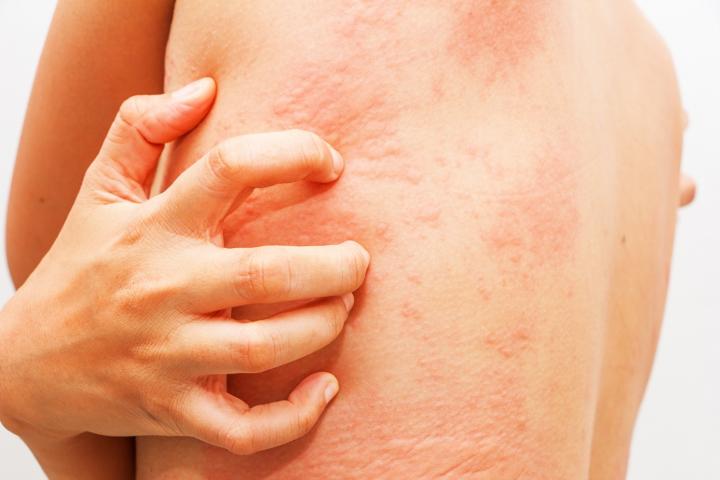Summary: People with chronic itching conditions such as eczema and psoriasis are at increased risk of stress, depression, and suicidal thoughts than those without such skin conditions.
Source: Elsevier
Itch is a very common symptom in patients suffering from skin diseases. In a new multicenter cross-sectional study on the psychological burden of itch in the Journal of Investigative Dermatology, published by Elsevier, investigators report that the presence of itch in dermatological patients was significantly associated with clinical depression, suicidal ideation and stress. They recommend providing patients with access to a multidisciplinary team to prevent and manage problems associated with itch..
The burden of itch has already been described in conjunction with a number of specific skin diseases including hand eczema; psoriasis; nodular prurigo (a skin disease that causes hard, itchy lumps to form on the skin); hidradenitis suppurativa (a painful, long-term skin condition that causes abscesses and scarring on the skin) among hemodialysis patients; and in chronic itch patients in general.
“There are already studies showing evidence of a correlation between itch and mental health problems in general, and in specific skin disorders, but there is a lack of a cross-sectional study across chronic skin diseases,” explained lead investigator Florence J. Dalgard, MD, PhD, Department of Dermatology and Venereology, Skåne University Hospital, Lund University, Malmö, Sweden.
Part of a large European multicenter study conducted by the European Society for Dermatology and Psychiatry (ESDaP), the present study compared the psychological burden of disease and health-related quality of life between dermatological patients with itch and those without itch, as well as with healthy controls.
Investigators collected data from dermatological clinics in 13 European countries on 3,530 patients with skin diseases and compared the results with more than 1,000 healthy controls. Patients completed questionnaires and were also examined clinically. Outcome measures included the presence, chronicity and intensity of itch; the Hospital Anxiety and Depression Scale; sociodemographics; suicidal ideation, and stress, including negative life events; and economic difficulties.
The prevalence of itch in dermatological conditions was nearly 90 percent in prurigo and related conditions; 86 percent in atopic dermatitis; 82 percent in hand eczema; 78 percent in other eczema; 76 percent in urticarial; and 70 percent in psoriasis.

The prevalence of depression was 14 percent in patients with itch compared to 5.7 percent in patients without itch, six percent in controls with itch, and three percent in controls without itch. The prevalence of suicidal thoughts was 15.7 percent in patients with itch, nine percent in patients without itch,18.6 percent in controls with itch and 8.6 percent in controls without itch. The reported occurrence of stressful life events was higher in individuals with itch than in those without itch. Patients with itch were also likely to experience more economic problems.
“Our research shows that itch has a high impact on quality of life,” commented Dr. Dalgard. “This study illustrates the burden of the symptom of itch and its multidimensional aspect. The management of patients with itch should involve access to a multidisciplinary team when necessary, as is already the case in several European countries.”
The investigators also recommend preventive measures, such as psoriasis education programs or targeted web-based information. In many chronic inflammatory skin disorders, early aggressive treatment tailored specifically for the patient might help to reduce itch at the earliest possible opportunity and prevent the development of mental health problems. Existing anti-itch interventions should be implemented more frequently in the routine care of dermatological patients.
Source:
Elsevier
Media Contacts:
Theresa Monturano – Elsevier
Image Source:
The image is credited to Journal of Investigative Dermatology.
Original Research: Open access
“Itch and mental health in dermatological patients across Europe: a cross sectional study in 13 countries”. Florence J. Dalgard et al.
Journal of Investigative Dermatology doi:10.1016/j.jid.2019.05.034 .
Abstract
Itch and mental health in dermatological patients across Europe: a cross sectional study in 13 countries
Itch is a highly prevalent and multi-dimensional symptom. We aimed to analyze the association between itch and mental health in dermatological patients. This multi-center study is observational cross-sectional conducted in dermatological clinics across 13 European countries. A total of 3530 patients and 1094 healthy controls were included. Patients were examined clinically. Outcome measures were itch (presence, chronicity and intensity), the Hospital Anxiety and Depression Scale, EQ5D-VAS, sociodemographics, suicidal ideation, stress (negative life events and economic difficulties). Ethical approval was obtained. Results showed significant association between the presence of itch in patients and clinical depression, suicidal ideation and economic difficulties (odds ratios respectively OR 1.53 (95% CI 1.15 to 2.02), OR 1.27 (95% CI 1.01 to 1.60), OR 1.24 (95% CI 1.10 to 1.50). The mean score of reported generic health status assessed by the EQ5D-VAS was 65.9 (SD=20.1) in patients with itch, compared to 74.7 (SD= 18.0) in patients without itch, p value < .001 and 74.9 (SD= 15.7) in controls with itch compared to 82.9 (SD= 15.6) in controls without itch, p value <.001. Itch contributes substantially to the psychological disease burden in dermatological patients and the management of patients should include access to multidisciplinary care.






